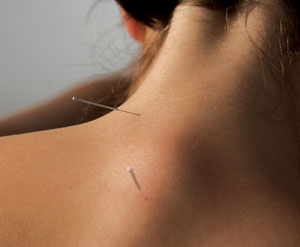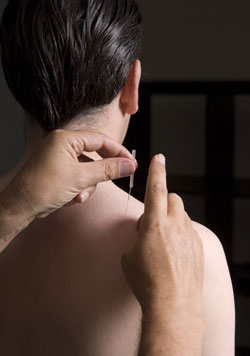Neck and Shoulder Pain
Home > A-Z of Conditions Treated by an Acupuncturist > Neck and Shoulder Pain
Neck pain or a stiff neck is a common problem and usually nothing to worry about.
 You can get a painful or stiff neck if you sleep in an awkward position, use a computer for a prolonged period of time, or strain a muscle because of bad posture or carrying a heavy object on one side. Anxiety and stress can cause tension in your neck muscles, which can lead to neck ache.
You can get a painful or stiff neck if you sleep in an awkward position, use a computer for a prolonged period of time, or strain a muscle because of bad posture or carrying a heavy object on one side. Anxiety and stress can cause tension in your neck muscles, which can lead to neck ache.
Other causes of neck pain:
- acute torticollis, a twisted or locked neck, which typically comes on overnight, caused by injury to the neck muscles
- cervical spondylosis, a type of arthritis caused by ‘wear and tear’ in the neck which may put pressure on the nerves in the neck resulting in: pain that radiates from the arms, pins and needles, and numbness in the hands and legs.
- whiplash, a neck injury caused by a sudden movement of the head forwards, backwards or sideways, which overstretches the tendons and ligaments in the neck. Whiplash may occur after a car accident and can cause tenderness in the neck muscles, reduced and painful neck movements, and headaches.
- cervical radiculopathy, a pinched nerve, usually caused by one of the discs between the bones of the upper spine (vertebrae) bulging outwards on to a nearby nerve. This condition is more common in the elderly and if severe, may require surgery.
MANAGING NECK PAIN
The NHS recommends you carry on with your normal daily activities, keep active, and take painkillers and/or anti-inflammatory medication and apply a warm pack/hot water bottle to relieve the symptoms. Very gentle neck exercises may help. If you are concerned that your neck pain could be more serious (eg if you have had an accident), it is not getting better or you have additional symptoms, such as co-ordination problems, a high temperature or unexplained weight loss, consult your GP.
PREVENTING NECK PAIN
You may find the following NHS advice helpful in preventing neck pain:
- make sure you have good posture when sitting and standing
- take regular breaks from your desk, driving or any activity where your neck is held in the same position for a long period of time
- if you often feel stressed, try relaxation techniques to help ease any tension in your neck
- avoid sleeping on your front, and make sure your head is in line with your body (not tilted to the side) if you sleep on your side
- only use enough pillows (usually only one) to keep your head level with your body
- make sure your mattress is relatively firm – a soft mattress could mean your neck is bent while you sleep
About Shoulder Pain
 Shoulder pain is a common problem with a number of different causes. Shoulder pain may be due to:
Shoulder pain is a common problem with a number of different causes. Shoulder pain may be due to:
- poor posture
- prolonged stress and muscle tension
- frozen shoulder, a very painful chronic condition that reduces or prevents normal movement in the shoulder joint
- rotator cuff disorders. The rotator cuff is a group of muscles and tendons that surround the shoulder joint and help keep it stable
- Shoulder instability, where the shoulder is unstable and may have an unusually large range of movement (hypermobility)
- acromioclavicular joint disorders, conditions, including osteoarthritis that affect the joint at the top of the shoulder (acromioclavicular joint)
- osteoarthritis in the shoulder joints
- a previously broken (fractured) bone, such as a fracture of the humerus (upper arm bone) or broken collarbone
Pain in the shoulder may also be caused by a problem in another area, such as the neck.
Conventional medical treatment for shoulder pain may include use of painkillers, anti-inflammatory drugs, ice packs, physiotherapy, steroid injections or surgery depending on the nature and severity of the condition.
ACUPUNCTURE FOR NECK AND SHOULDER PAIN
The World Health Organization report of acupuncture clinical trials (2003) includes Neck Pain and Periarthritis of the shoulder as conditions for which acupuncture has been proven effective. More recent research suggests that acupuncture is a cost effective treatment for chronic neck pain. Acupuncture plus massage has been shown to benefit patients with cervical spondylitis.
Acupuncture may help relieve pain, inflammation, muscle and joint stiffness and so may help in the treatment of neck and shoulder pain by:
- Stimulating nerves in muscles and other tissues, leading to production of endorphins (natural pain relieving substances)
- Changing pain processing in the brain and spine
- Reducing inflammation
- Reducing muscle stiffness and improving joint mobility by improving circulation which aids reduction in swelling
- Calming sympathetic nervous activity, to promote relaxation and reduce tension
See also:
Treating Neck and Shoulder Pain
 “In Chinese Medicine, acute neck ache is either due to the invasion of an external pathogenic factor, Wind–Cold, quite literally a chill; or a sprain. Some patients report that their neck problems get worse when it’s windy, so it’s really important to keep your neck covered up in cold, windy weather.
Tension and stress also play a significant role in neck and shoulder problems. Stress causes the neck muscles to tense and pulls the head backwards. In my experience, acupuncture combined with massage is more effective in the treatment of neck and shoulder conditions than either therapy alone.”
“In Chinese Medicine, acute neck ache is either due to the invasion of an external pathogenic factor, Wind–Cold, quite literally a chill; or a sprain. Some patients report that their neck problems get worse when it’s windy, so it’s really important to keep your neck covered up in cold, windy weather.
Tension and stress also play a significant role in neck and shoulder problems. Stress causes the neck muscles to tense and pulls the head backwards. In my experience, acupuncture combined with massage is more effective in the treatment of neck and shoulder conditions than either therapy alone.” FURTHER INFORMATION
Maciocia, G. 2005. The Practice of Chinese Medicine. Painful Obstruction Syndrome. 561-604. Churchill Livingstone
Research Fact Sheets
For more information see the British Acupuncture Council Research Fact Sheet below.
Testimonials
Testimonials
“After having a Rotator Cuff repair operation in January 2009 I unfortunately managed to re tear it in December 2010. I have been suffering with quite a bit of pain ever since and have been living on painkillers. I have been seen by a few
Consultants and they all want to operate and say I may not regain the range of movement I now have.
Judy has been amazing and after only five sessions with her I am completely pain free it is really amazing and I feel so much better without all the painkillers and now no operation is needed for at least 10 to 15 years.”
“I first discovered Chinese massage on a cruise boat on the Yangtze river when I visited China and was so impressed with how it helped my aches and pains that I immediately searched for someone who could do this when I got home. Luckily I found Judy with her clinic in Crowborough right on my doorstep. As a horse rider I have had many knocks and falls over the years and had been suffering from whiplash for the last 2 years. Judy recommended combining the massage with acupuncture and it has helped so much with great results. For the first time in over 2 years my neck is now pain free.
I cannot thank Judy enough for the help and relief her treatments have given me. It is a holistic treatment for the whole body that leaves you with a true feeling of wellbeing and relaxation.”
“I decided to contact Judy for acupuncture after suffering from chronic migraines, I had resorted to taking daily preventative medication for the pain but did not want to rely on the medication long term. Judy has been treating me with acupuncture and massage the care and attention I have received from Judy has always been outstanding. Her professionalism and knowledge has greatly improved my understanding of migraines, how best to manage them and my wellbeing. I still see her for occasional treatment for neck and back tension due to my type of work but have been able to stop taking the medication which I was so reliant on before. Thank you Judy.”
“I have been treated by Judy for the past 6 months for a series of chronic and acute conditions including PMR, osteoarthritis and pulled muscles and ligaments. I found Judy’s knowledge and practice of acupuncture to be excellent and for me the outcomes have been particularly great in the areas of pain management and recovery from injury. My overall health, stamina and sense of wellbeing has improved significantly and I have finally regained much of my old energy levels.
Judy is a warm, confident practitioner who works closely in partnership with her patient. I would highly recommend her.”



